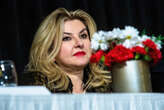The idea of a financial fast, a term coined by author Michelle Singletary, is that for a specified period of time, you cut out any nonessential spending. Groceries and utility bills are fine, but DoorDash is a no.
I knew I needed to make a change in my spending habits, and I was willing to get drastic, so for three weeks in September, I gave it a try. But I didn’t really consider how uncomfortable it would make me and what painful lessons I would learn from the experiment.
I approached my fast from two directions: squeeze more money and value out of my existing resources, and stop spending on nonessentials. I was decidedly better at one tactic than another.
Take advantage of existing resources
I’ll admit I enjoyed the creative experiment of digging through the meats and vegetables that had been piling up in the freezer in order to whip up new meals. That staved off a grocery trip for more than a week. By hitting the farmers market the following week I was able to drastically slash my usual grocery budget. Even small things, like squeezing an extra two weeks out of the bottle of dish soap that looked like it was done, added up.
Monthly subscriptions are another simple way to trim the fat from my spending. This was immensely satisfying, actually: app subscription fatigue is a real thing. I had a dozen or more books queued up in Audible anyway, and I even managed to find a couple of streaming subscriptions I didn’t even realize I was still paying for. I ended up cutting $78 per month in streaming subscriptions, that over the course of a year might add up to a vacation. I discovered a wealth of forgotten favorite sweaters instead of buying new ones; I delved into the books on my “to be read” list rather than buying the newest bestseller.
These exercises helped me realize the riches I already do have. And the savings helped cover the unexpected expenses that life has a tendency to throw at everyone: in my case, an unexpected vet bill and car repair bill.
Curb nonessential spending
The first 10 days were a breeze: I declined invitations for dinner and drinks and was proud of my virtuousness. After that, though, not so much. A friend had a free ticket to see one of my favorite bands in concert, so it seemed like a no-brainer. But a $25 Lyft ride and a $55 bar bill at the concert venue pretty much wiped away the savings I’d added from my earlier frugality. I held a book event and earned money through sales, then frittered away a portion of that with a celebratory dinner immediately afterwards. The initial euphoria at saving soon paled in the face of everything I was missing out on.
That’s not surprising, says Nicole L. Hoag, a certified financial planner at Schwartz & Co. She doesn’t recommend a financial fast for her clients because “it is unsustainable. Financial wellness is a lot like any other major habit change,” she says. She recommends that her clients instead “gradually cut back to cut it out” instead of trying to drastically fix everything at once and suffer the backlash.
Slow and steady
“My tip is to make small, almost imperceptible changes at first,” says Hoag. The changes I had already made were a good and sustainable way to start. Fewer dinners out, reevaluating subscriptions, utilities and insurance policies, are all on her list of recommended changes. Even more importantly, she says, is to curb the ‘worry about it later’ mentality. Our reliance on credit cards and need for instant is a major problem. Everyone’s situation will be different,” she says, “but what got you into financial distress is sometimes more important to address than the financial problem itself.” Hoag stresses the importance of building healthy spending and saving patterns over time, rather than a fix-it-all-right-now approach.
In addition to the slow-and-steady approach to saving, Hoag also recommends regular financial checkups. “Any day that ends in a y” is a good time, she says, but she advises her clients to consult their financial professionals “particularly prior to major life events: moving, buying a house, a major medical issue, marriage, divorce, babies, college, retirement, caring for ill or aging family.”
Although I’m glad I tried the experiment, I’m not sure I’d take such drastic measures again. The financial fast did give me a chance to pore over my expenditures and take a hard look at how lifestyle creep might be affecting my spending patterns. As Emily Guy Birken wrote in a recent Fast Company article, “Financial fasting defines what you value,” and I discovered that I’m happy to trim the budget on groceries but value my entertainment and socializing time too much to quit it cold turkey. Part of the reason for the financial fast is to distinguish the must-haves from the nice-to-haves. Now I will plan for these expenses rather than imagining that I can abstain. At the very least, my three-week financial reset reminded me to check in with my financial advisor more frequently, and to take advantage of the wealth of audiobooks and sweaters I’ve rediscovered.








No comments